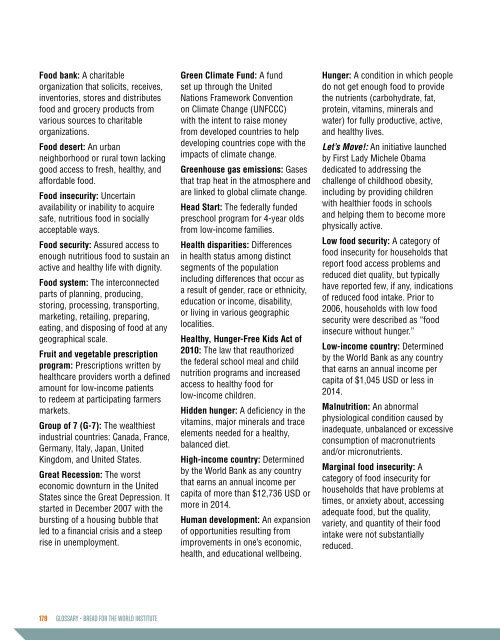THE NOURISHING EFFECT
HR2016-Full-Report-Web
HR2016-Full-Report-Web
You also want an ePaper? Increase the reach of your titles
YUMPU automatically turns print PDFs into web optimized ePapers that Google loves.
Food bank: A charitable<br />
organization that solicits, receives,<br />
inventories, stores and distributes<br />
food and grocery products from<br />
various sources to charitable<br />
organizations.<br />
Food desert: An urban<br />
neighborhood or rural town lacking<br />
good access to fresh, healthy, and<br />
affordable food.<br />
Food insecurity: Uncertain<br />
availability or inability to acquire<br />
safe, nutritious food in socially<br />
acceptable ways.<br />
Food security: Assured access to<br />
enough nutritious food to sustain an<br />
active and healthy life with dignity.<br />
Food system: The interconnected<br />
parts of planning, producing,<br />
storing, processing, transporting,<br />
marketing, retailing, preparing,<br />
eating, and disposing of food at any<br />
geographical scale.<br />
Fruit and vegetable prescription<br />
program: Prescriptions written by<br />
healthcare providers worth a defined<br />
amount for low-income patients<br />
to redeem at participating farmers<br />
markets.<br />
Group of 7 (G-7): The wealthiest<br />
industrial countries: Canada, France,<br />
Germany, Italy, Japan, United<br />
Kingdom, and United States.<br />
Great Recession: The worst<br />
economic downturn in the United<br />
States since the Great Depression. It<br />
started in December 2007 with the<br />
bursting of a housing bubble that<br />
led to a financial crisis and a steep<br />
rise in unemployment.<br />
Green Climate Fund: A fund<br />
set up through the United<br />
Nations Framework Convention<br />
on Climate Change (UNFCCC)<br />
with the intent to raise money<br />
from developed countries to help<br />
developing countries cope with the<br />
impacts of climate change.<br />
Greenhouse gas emissions: Gases<br />
that trap heat in the atmosphere and<br />
are linked to global climate change.<br />
Head Start: The federally funded<br />
preschool program for 4-year olds<br />
from low-income families.<br />
Health disparities: Differences<br />
in health status among distinct<br />
segments of the population<br />
including differences that occur as<br />
a result of gender, race or ethnicity,<br />
education or income, disability,<br />
or living in various geographic<br />
localities.<br />
Healthy, Hunger-Free Kids Act of<br />
2010: The law that reauthorized<br />
the federal school meal and child<br />
nutrition programs and increased<br />
access to healthy food for<br />
low-income children.<br />
Hidden hunger: A deficiency in the<br />
vitamins, major minerals and trace<br />
elements needed for a healthy,<br />
balanced diet.<br />
High-income country: Determined<br />
by the World Bank as any country<br />
that earns an annual income per<br />
capita of more than $12,736 USD or<br />
more in 2014.<br />
Human development: An expansion<br />
of opportunities resulting from<br />
improvements in one’s economic,<br />
health, and educational wellbeing.<br />
Hunger: A condition in which people<br />
do not get enough food to provide<br />
the nutrients (carbohydrate, fat,<br />
protein, vitamins, minerals and<br />
water) for fully productive, active,<br />
and healthy lives.<br />
Let’s Move!: An initiative launched<br />
by First Lady Michele Obama<br />
dedicated to addressing the<br />
challenge of childhood obesity,<br />
including by providing children<br />
with healthier foods in schools<br />
and helping them to become more<br />
physically active.<br />
Low food security: A category of<br />
food insecurity for households that<br />
report food access problems and<br />
reduced diet quality, but typically<br />
have reported few, if any, indications<br />
of reduced food intake. Prior to<br />
2006, households with low food<br />
security were described as “food<br />
insecure without hunger.”<br />
Low-income country: Determined<br />
by the World Bank as any country<br />
that earns an annual income per<br />
capita of $1,045 USD or less in<br />
2014.<br />
Malnutrition: An abnormal<br />
physiological condition caused by<br />
inadequate, unbalanced or excessive<br />
consumption of macronutrients<br />
and/or micronutrients.<br />
Marginal food insecurity: A<br />
category of food insecurity for<br />
households that have problems at<br />
times, or anxiety about, accessing<br />
adequate food, but the quality,<br />
variety, and quantity of their food<br />
intake were not substantially<br />
reduced.<br />
178 GLOSSARY • BREAD FOR <strong>THE</strong> WORLD INSTITUTE


